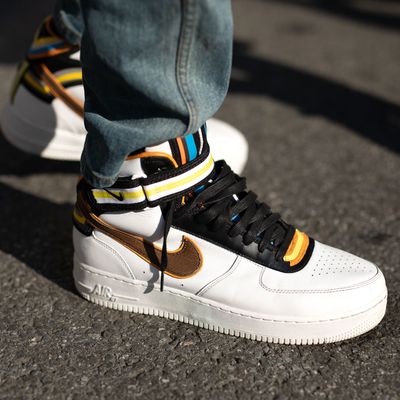
“Believe in something, even if it means sacrificing everything.” By now, everyone’s read the tagline on Nike’s ad featuring Colin Kaepernick. The text refers to Kaepernick’s NFL protests against racism and police brutality, and it resonated — both positively and negatively — across social media. But among the louder reactions, a smaller group of people asked: “Isn’t this the same company known for sweatshop labor?”
Writer Hoda Katebi tweeted, “Rad @Nike is backing @Kaepernick7 rn, but I wish they’d also back the garment workers of color they exploit in their sweatshops, bc you know they also exist & backing dope ppl doesn’t justify ur violence abroad. If we pro justice for ppl of color, let’s not be exclusive.”
There are plenty of examples of the fashion industry taking advantage of workers around the world — including several deadly incidents and ongoing life-threatening conditions. Nike’s reputation for using unfair labor goes back to the 1970s, when it first moved production overseas. In the ’90s it was, “synonymous with sweatshops,” according to its own then-CEO. It was the focus of widespread protests for its use of child labor and factories with poor working conditions.
Nike has done bang-up job of reversing that image. Business of Fashion and Morgan Stanley have both hailed the company for its sustainability efforts. Nike has an entire site dedicated to its social impact with stories, stats, and pictures of happy people working in its factories. Now, by aligning itself with Kaepernick, Nike stands for a new kind of activism and has new power. And with that new power comes more responsibility. For the most part, Nike has done a good job. But there’s a glaring omission, and sustainable fashion watchdogs have noticed.
The Fashion Revolution transparency index gave Nike a 36 percent (which is higher than the average score of 21 percent) and the company received a C from the Ethical Fashion Report, who also gave it the lowest score in terms of implementing a living wage or improving wages in their factories. Sarah Ditty, the head of policy at Fashion Revolution, told the Cut that Nike scored well when it came to publishing supplier lists and setting long-term goals. However, when it came to “deeper issues” including living wages and unionization for garment workers, Nike scored 20 percent, which was just above average.
This is Nike’s biggest issue within their product chain. There’s little transparency about what it is actually paying factory workers, and little to no public effort to actively raise wages for the people who make its clothes. In the FY16/17 sustainable business report for Nike, the word “wages” is only used four times. By comparison, “collective bargaining” is used 9 times and “waste” is used 120 times.
In the Code of Conduct for factories with which the brand partners, it says that workers should be paid the “minimum or prevailing wage,” whichever is higher. That’s great, especially because Nike’s code of conduct is certified by the Fair Labor Association. However, in many of the countries where Nike outsources production, the minimum wage is very different from a living wage — one that allows people to buy basic necessities including food and medicine.
The International Labor Organization has called a living wage a basic human right. Calculating a living wage is complicated, but groups that study ethical production agree that it’s higher than the minimum wage in many countries. For example, in Vietnam — where Nike has 91 finished-goods factories and over 400,000 workers — the minimum wage is approximately $150 USD per month (basically the price of a pair of Nike FlyKnits) while the living wage is estimated at $290, according to The Global Living Wage Coalition, which publishes region specific living wage benchmark reports across the world.
Another study from Clean Clothes Campaign found in 2016 that in Indonesia, where Nike has 39 finished goods factories and nearly 200,000 workers, the minimum wage was $95.50 per month, but workers surveyed said they would need $310.24 to meet their basic needs. One report said it would be a relatively small increase in costs to pay workers a living wage, provided that companies have the infrastructure to make sure that workers reap the benefits.
Nike has set goals for lowering CO2 emissions and reducing its waste to landfill by 2020. It also has implemented surveys in their factories to improve quality of life and reports that 91 percent of their factories meet their Code of Conduct (which means they pay a minimum or prevailing wage). These changes are no small thing, but for a company that’s proud to be miles ahead of the competition, improving wages shouldn’t be overlooked. To be sure, few companies have tried to promise a living wage. H&M did in 2013, but quickly backtracked. As of yesterday, Zara’s parent company Inditex quietly voiced support for a living wage achieved through collective bargaining in factories in Bangladesh.
A common argument — one that Nike itself made until 2001 — is that the factories are subcontracted, and the fashion brands we buy from have little to do with the conditions inside the factory. When workers in Turkey put notes in Zara clothes saying they hadn’t been paid yet, Inditex viewed its intervention and compensation for the workers as above and beyond what was required. That’s the norm for many fashion brands. Nike has changed their stance, but not enough. As Nike embraces going above and beyond, the people who create their clothes should feel those benefits as well.
The Kaepernick ad captures a cultural moment and shows support for people of color and those affected by police brutality in the United States. It should be celebrated, shared, and supported, but it should also be viewed as a first step. A powerful next step, one that would make a difference in the lives of millions of people, is to make sure workers in Vietnam, Indonesia, and Taiwan are being paid enough to live.




